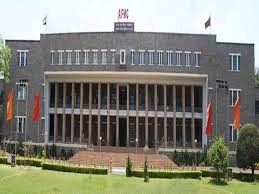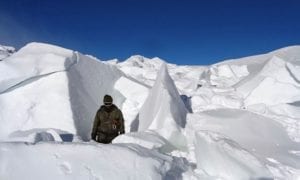Dhastagir Sheriff
Chennai, Tamil Nadu, India
 |
| Fig.1. Armed Forces Medical College, Pune, India. |
“The patriot’s blood is the seed of Freedom’s tree.”
– Thomas Campbell
India, like many other countries, has doctors serving in the army as well as tertiary care hospitals that provide medical services to the armed forces personnel. It also trains students to become physicians and surgeons to serve as commissioned medical officers. The candidates for these positions are selected on the basis of a single written examination, followed by an interview and a medical fitness evaluation. On successful completion of their medical graduation, they are given the rank of a captain or major, receive their military training as soldiers in the army, air force, or navy, and will be assigned to serve to protect at the border or counter-insurgency areas as well as provide requisite medical aid to soldiers, including emergency and trauma care.1
There are clearly defined protocols and standard operating procedures for all doctors in the armed forces. These are to be strictly complied with. The work can be onerous. The borders between India and China or India and Pakistan mostly lie in the snow bed of the Himalayas, the hot sands of Rajasthan, or the salty marshes of Gujarat.
Soldiers are assigned to stations at heights of 4000–6700 meters (13000–22000 feet) above mean sea level, wearing special uniforms and clothing, with a sea of snow around with minimal facilities, living in caves, tents, or temporary tenements.1
They may also have to brave the scorching heat of the desert or the relentless humid heat of the salty marshes, in addition to the incessant threat of warfare. Living in such close vicinity of death, in a desolate land with no social or human interaction with a strict military protocol, a military doctor has to work against all odds in a deeply depressing environment. Overworked doctors sometimes experience a burnout syndrome and some may suffer from the impaired physician syndrome.2-3
Burnout among doctors is a global phenomenon. Feelings of exhaustion or helplessness may cause a practicing physician to feel tired and dejected. This phenomenon has many contributing factors depending upon the environment and policies of a particular place of work, a community, or a nation. Environmental stress, a depersonalized approach to treatment, and low self-esteem may aggravate burnout symptoms in physicians serving in those conditions.3
 |
| Fig.2. A Soldier on duty in the Himalayan Border |
It might be difficult to find accurate criteria to statistically measure burnout phenomenon, but it is imperative that we understand the psychological burden a physician may face. Doctors working with the armed forces have the additional stress of adverse living conditions, serving in active combat zones, accompanying their combatant colleagues to hazardous areas during active patrolling of borders, or having to defuse a bomb from terrorists.1 The feeling of loneliness, separation from the family, living in an isolated territory, and the grim atmosphere may affect the doctors’ psyche.
As a civilian professor serving in a faculty of medicine in Benghazi, Libya, I too had the taste of serving in a tense atmosphere when the Arab uprising that began in Tunisia spread to other Arab nations.5 When the peaceful city of Benghazi was turned into a chaotic and violent area gripped by civil war, I witnessed bomb blasts, fusillades of shooting from automatic firearms, helicopter-guided bombings, and the loss of civilian lives around me. I saw youngsters, males and females, carrying automated weapons, weapon launchers, and mortar vehicles all around the cities. There were teens patrolling the streets of Benghazi. The historical building of the university and other residential areas as well as the Benghazi airport and the surroundings were bombed and made non-functional.
The shootings, chaos, loss of security and peace, and mass destruction seemed to have engulfed the city. With the help of one of my students, I managed to leave Libya safely. That short journey from Benghazi to the neighboring airport was indeed a ghost ride. We had to cross barricades every five hundred meters with teens wielding automated weapons. Somehow I managed to reach the airport and could get a flight to India.
When we live freely in the carefree atmosphere of our cities we do not value our secure environment. We tend to forget that this secure environment is provided by our armed forces personnel whose health is taken care of by armed forces doctors. They perform their duties in inhospitable areas with devotion to duty so that we can stay protected. Cities lacking this protection are likely to become terror-prone areas like Benghazi. We live in peace because of the blanket of security provided by the armed forces and also its doctors.1
References
- Armed Forces Medical College, Pune, India. https://www.afmc.nic.in/
- Sheriff D S Regulating medical education. Natl Med J India. 5(5):251.1992.
- Shailesh K. Burnout and Doctors: Prevalence, Prevention and Intervention. Health Care (Basel). 4(3): 37.2016.
- Maj Laishram Jyotin Singh; Ashoka Chakra (Posthumous);Gallantry Awards, Ministry of Defense, Government of India, 2010.
- Erin Blakemore What was the Arab Spring and how did it spread? National Geographic, Mar 29,2019.
DHASTAGIR SULTAN SHERIFF, PhD, is a Professor from the Faculty of Medicine at Benghazi University in Libya. He is now living in India and has an expertise in Medical Biochemistry. He is the author of a text book titled Medical Biochemistry along with five monographs and over 150 research publications. He has written this article as his token of love and gratitude to doctors in the army.

Leave a Reply